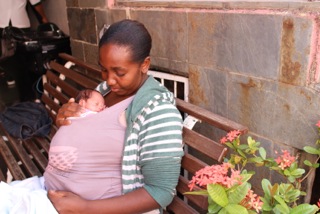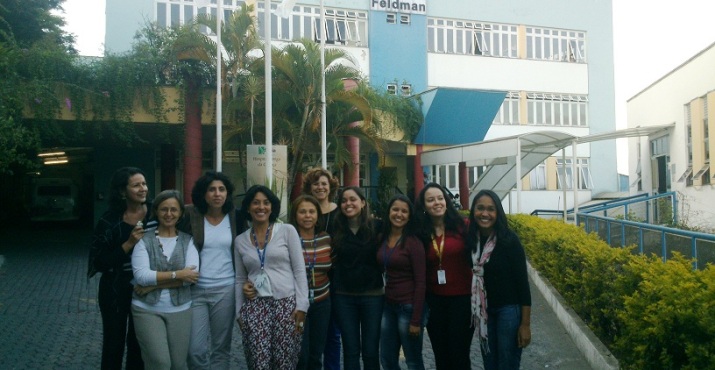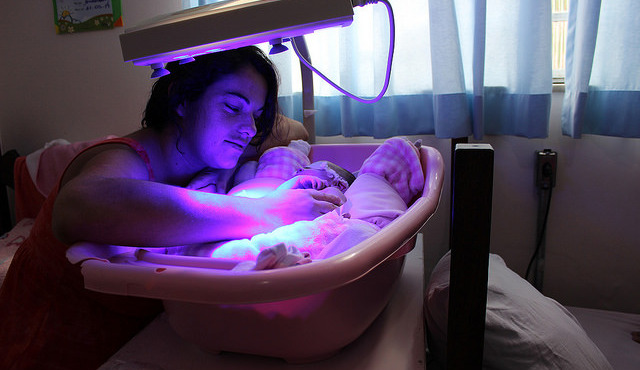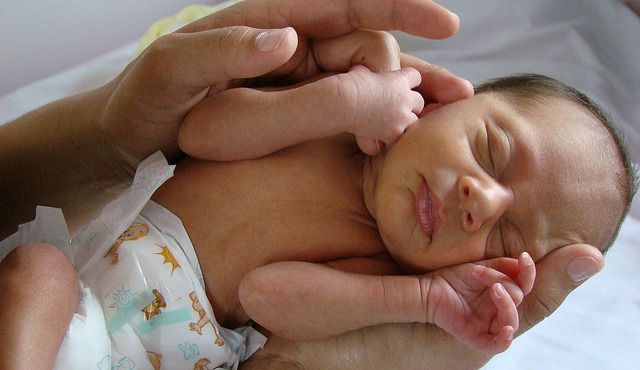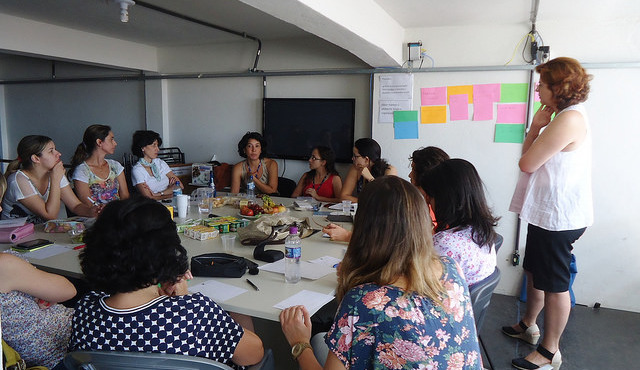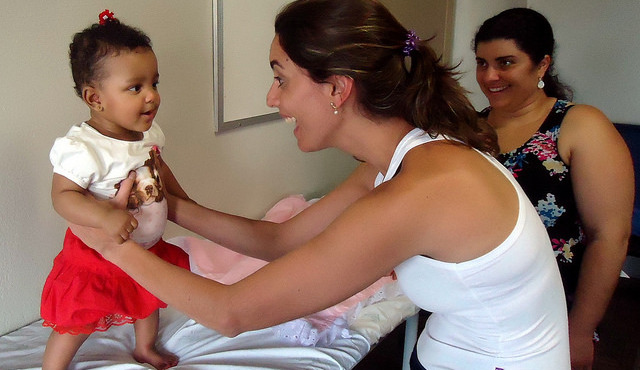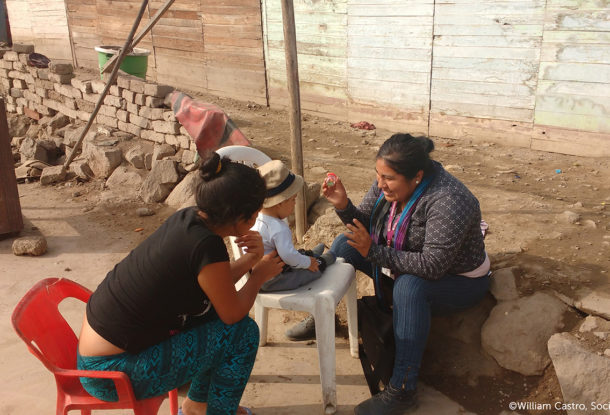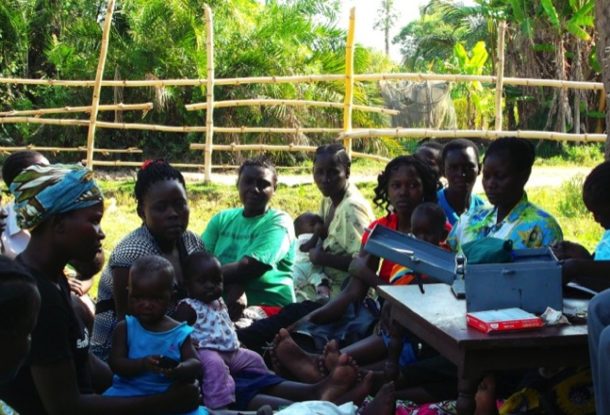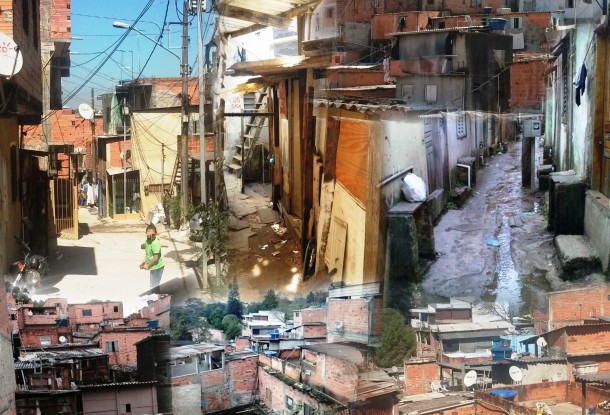Innovation Summary
 This project aims to strengthen the emotional bond between infants and their caregivers, reduce parental stress and stimulate caretaking practices to promote the development of premature babies born at the Sofia Feldman Hospital.
This project aims to strengthen the emotional bond between infants and their caregivers, reduce parental stress and stimulate caretaking practices to promote the development of premature babies born at the Sofia Feldman Hospital.
The innovation plans to introduce a strategy into routine care at the Casa do Bebê to recognize behaviors and individuality of the baby. This strategy, known as the Newborn Behavior Observation, will favor engagement and work to increase self-confidence in the parents. Parents will also participate in individual sessions, built to help parents understand their babies’ needs and how to deal with them. In addition, they will be expected to participate in two workshops to build a portfolio, where they will have the opportunity to express their feelings concerning their baby’s achievements and their expectations about their child’s future.their wishes and expectations.
Gallery
Impact
- 50% reduction in the risk of preterm children experiencing developmental delay.
- 50% of the primary caregivers will feel less stressed and more confident after being trained in the intervention.
- 25 health care workers will be trained to deliver the intervention.
- 200 mothers and 100 fathers will receive intervention.
Innovation
This project will provide an intervention for families of premature babies who were referred to Casa do Bebê at the Sofia Feldman Hospital (HSF). The Casa do Bebê is a support house neighboring HSF, where preterm born babies stay with their mothers when they are stable and not requiring services at HSF, until they are well enough to be discharged. Currently, families do not receive extensive programming during their stay at the support house.
The goal of the study is to implement a program at Casa do Bebê that strengthens the bond between the family and the child, through helping families recognize the babies’ potential, and reducing parental stress.
During individual sessions with trained staff members, families will be taught skills part of the Newborn Behavior Observation [1] strategy to help them to understand their babies’ needs and how to address them.
Each mother/family will also participate in at least two workshops to build a portfolio on their babies. These portfolios will serve as an opportunity for parents to express their feelings concerning their babies, such as expectations, fears, desires, etc. The portfolio will record the parents’ desires, expectations, and developmental milestones for their infant through sewing, painting and other cultural outlets.
Some community volunteers will be invited to participate in the workshops. Other family members may also participate, which will lead to increased social support and reduction of maternal stress.
After staying at the Casa do Bebê for about seven days, the infants and their families will be followed up at 2, 4, 6, 9 and 12 months of age, and the team will monitor their health and development at the outpatient clinic. At each visit, families will receive new recommendations on how to promote the health and development of the infants. There will be activities that will allow families to recognize the babies’ achievements and express their anxieties. Furthermore, at each follow-up visit, families will be encouraged to review their portfolio, and continuing recording the baby’s progress.
Collaboration
Funders
- Grand Challenges Canada
Key Partners
- Federal University of Minas Gerais/Hospital das Clínicas (Brazil)
- Sofia Feldman Hospital (Brazil)
Implementation
Key Drivers
Project team motivated
There is a team motivated, with expertise on the subject and large enough to carry out the proposed activities.
Beneficiaries support
Proposed intervention will have positive benefits for children/families, but for health services and providers as well, encouraging their adherence and support of the project.
Achievable sample size for demonstrable impact
The sample size needed to demonstrate the impact of interventions is possible to be achieved with the inclusion of children in the Casa do Bebê and the ACRIAR during 6 months.
Challenges
Families unable to travel to follow-up appointments
Most families live in very small cities around the city and are unable to travel due to their poor socioeconomic conditions. A strong active search scheme and transport will be offered to families that require the services, to support their adherence and follow-up.
High turnover of health workers
The high turnover rate of hospital health workers is a serious challenge for the program. To overcome this, it will be necessary to negotiate with the hospital board, highlighting the benefits of change, aligned with their vision as well. It is likely that new training workshops will need to occur to mitigate this problem.
Continuation
The intervention model will be extended to the neonatal unit and the ACRIAR clinic of the Hospital das Clínicas, during the course of the grant. If efficiency is demonstrated, the model will be presented to other similar settings around the Minas Gerais State.
Evaluation Methods
The program will use a randomized control trial to evaluate impact of the intervention.
Evaluation impact for mothers
All mothers will complete a structured questionnaire upon arrival at Casa do Bebe. The questionnaire will cover topics such as pregnancy, childbirth, socioeconomic and demographic factors. Maternal depression symptoms and parental stress will also be evaluated.
Aside from different assessments used to assess parent knowledge and behavior (see resource section), family interactions will be videotaped at 6 months and evaluated for quality of interaction.
- At the visits which occur when the child is 6 and 12 months, families will be tested for parental practices23, parenting stress, [4] and toddler socioemotional development5
- At 6 months, the family will be videotaped presenting a novel toy to the infant to evaluate the quality of the interaction between mother and child. A sample of 20% of the videos will be randomly selected to be coded.
- At the 9-month home visit, families will be tested to assess stressful events, [6] such violence, and the home environment. [7]
Infant health and nutrition will be monitored by the indices of weight, height, cephalic perimeter and cutaneous folds for the corrected gestational age.
Development will be monitored using scales validated for the Brazilian population. [8, 9]
References
- The Newborn Behavioral Observations system: What Is It? The Brazelton Institute.
- Cox JL, et al. (1987) Detection of postnatal depression. Development of the 10-item Edinburgh Postnatal Depression Scale. Br J Psychiatry. 150:782-6.
- Martins GDF, et al. (2010) Construção e validade da Escala de Crenças Parentais e Práticas de Cuidado (E-CPPC) na primeira infância. Psico USF: 15(1), p.23-34
- Norbeck JS, et al. (1981) The development of an instrument to measure social support. Nursing Research:30, 264-269
- Abidin RR. (1995) Parenting Stress Index: Professional Manual. Ed 3rd. Psychological Assessment Resources I, editor. Odessa, FL.
- Briggs-Gowan M, Carter A. BITSEA, Brief Infant –Toddler Social Emotional Assessment. Examiner’s manual. Massachusetts: Yale University and the University of Massachusetts; 2006
- Sarason I G, et al. (1978) Assessing the impact of life changes: Development of the Life Experiences Survey. J Cons and Clinical Psy: 46, 932-946
- Bradley R, et al. (1994) Early Indications of Resilience and Their Relation to Experiences in the Home Environments of Low Birthweight Premature Children Living in Poverty. Child Development; 65:346–60.
- Fernandes LV, et al. (2012) Neurodevelopmental assessment of very low birth weight preterm infants at corrected age of 18-24 months by Bayley III scales. J Pediatr. 88(6):471-8
- Sheldrick RC, et al. (2013) Evidence-based milestones for surveillance of cognitive, language, and motor development. Academic pediatrics; 13(6):577–86
Resources
-
Research
-
Abrams M, et al. (1995) Maternal “depression” effects on infants’ Brazelton Scale performance. Infant Mental Health Journal. 16:231–5.
-
Beaton D, et al. (2000) Guidelines for Process of Cross-Cultural Adaptation of Self-Report Measures. Spine. 25: 3186–91.
-
Boyd L. et al. (2013) Social-emotional delays at 2 years in extremely low gestational age survivors: correlates of impaired orientation/engagement and emotional regulation. Early human development. 89(12):925–30.
-
Brasil. Ministério da Saúde. Secretaria de Atenção à Saúde. Departamento de Atenção Básica. Saúde da criança: crescimento e Desenvolvimento. Brasília: 2012. 272p.
-
Brasil. Ministério da Saúde. Secretaria de Atenção à Saúde. Portaria nº 1.459, de 24 de junho de 2011. Institui, no âmbito do Sistema Único de Saúde, a Rede Cegonha. Brasilia. 2011.
-
Yu YT, et al. (2013) A psychometric study of the Bayley Scales of Infant and Toddler Development - 3rd Edition for term and preterm Taiwanese infants.Res Dev Disabil. 34(11):3875-83. Epub 2013 Sep 9.
-
Grantham-Mcgregor S. et al. (2007) Developmental potential in the first 5 years for children in developing countries. Lancet. 2007; 369: 60–70.
-
Gray PH, et al. (2013) Parenting stress in mothers of very preterm infants - influence of development, temperament and maternal depression. Early human development. 2013;89(9):625–9.
-
Hwang A-W, et al. (2013) A randomized controlled trial of routines-based early intervention for children with or at risk for developmental delay. Res in develop disab. 34(10):3112–23.
-
Martin A, et al. (2008) Long-term maternal effects of early childhood intervention: Findings from the Infant Health and Development Program (IHDP). J Ap Develop Psy 29. 101–117.
-
Moreira RS, et al. (2013) De. Instrumentos de avaliação para os dois primeiros anos de vida do lactente. J Human Growth and Develop. 23(2):215–21.
-
Nugent, JK, et al. (2012) Understanding Newborn Behavior and early relationships. Paul H Brookes Publishing Co. 4 ed. 256p.
-
Perez-Pereira M, et al. (2013) Neurobehavioral development of preterm and full term children: biomedical and environmental influences. Early human development. 89(6):401–9.
-
Perrin EC, et al. (2011) Making the link barriers to early diagnosis. Grantmakers for Children, Youth & Families. (8):1–6.
-
Rugolo LMSS. (2005) Crescimento e desenvolvimento a longo prazo do prematuro extremo. Jornal de Pediatria. 81(1 Supl):101–10.
-
Shonkoff JP, et al. (2007) The Timing and Quality of Early Experiences combine to shape brain architecture. National Scientific Council on the Developing Child. Cambridge; p. 9.
-
Walker SP, et al. (2011) Inequality in early childhood: risk and protective factors for early child development. Lancet. 378 (2011):1325–38.
-
-
Instruments & Batteries
-
Edinburgh Postnatal Depression Scale. Core metrics: presence and intensity of depressive symptoms in the last seven days.
-
Scale of Parental and Practical Beliefs of Care in First Infancy. Core Metrics: Parent´s beliefs and practices of care in children under 3 years old. Sub-scales: primary care; corporal contact; corporal stimulation, stimulation by objects, face to face contact.
-
Social Norbeck Support Questionnaire. Core Metrics: functional types of social support: affect, affirmation, and aid.
-
Parenting Stress Index. Core Metrics: parental distress, parent-child dysfunctional interaction and difficult child.
-
Brief Infant-toddler Social and Emotional Assessment (BITSEA). Core Metrics: social and emotional infants behavior.
-
Life Experiences Survey. Core Metrics: self-report of positive and negative events experienced over the previous year, and the perceived stress associated with those events.
-
Home Observation for Measurement of the Environment. Core Metrics: quality and quantity of stimulation and support available to a child in the home environment.
-
Bayley III. Core metrics: major developmental domains: cognitive, language, motor, adaptive behaviour and social-emotional.
-
Survey of the Wellbeing of Young Children. Core Metrics: developmental milestones, social/emotional development, and family risk factors.
-
-
Multimedia
